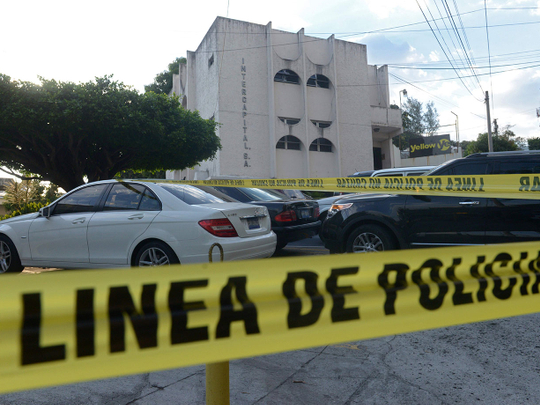
For nearly a week late last month, a modicum of peace appeared to have settled over El Salvador. After the country’s leading criminal gangs called a unilateral truce, violent crime suddenly plunged, and the homicide rate fell to around nine a day.
If that doesn’t sound like much to cheer about, consider this: The small Central American nation of about 6.5 million people recently became the murder capital of the world, logging around 104 homicides per 100,000 inhabitants in 2015; the nation’s capital itself, San Salvador, logged nearly double that rate.
El Salvador hasn’t seen this level of violence since its 1980-1992 civil war, and there are indications it’s getting worse. That’s one of the main reasons El Salvador has led the dramatic increase in Central American refugees fleeing to other countries, including the US, since 2013 due to violence.
But now, even the modest respite offered by the truce looks like an optical illusion. The gang ceasefire, it seemed, was a bargaining chip being used by some of the deadliest criminals in the Americas. Their play: In exchange for the government’s agreement to suspend its gang crackdown and cancel its plan to send crime bosses to a maximum-security penitentiary, they would call off the deadly war between their factions.
President Salvador Sanchez Ceren deserves some credit for not getting hoodwinked by the ceasefire. After all, the two most powerful Salvadoran gangs, Mara Salvatrucha and Barrio 18, were essentially flaunting their power. So instead of easing up, Sanchez Ceren doubled down, and in a land embittered by partisan politics, he managed to get virtually all parties on board with the gang crackdown.
Not surprisingly, the government’s measures centred on reining in the corrupt prison system that in El Salvador— as in other Latin American countries — has become a system of command centres for crime. The government went ahead with the prisoner transfers, deploying troops, Humvees and police to remand 299 inmates from seven prisons to an isolated lock-up. Sanchez Ceren also ordered telephone operators to block the mobile-phone signals in the vicinity of the prison, and for the first time, El Salvador’s wireless carriers complied without a fuss.
Dire situation
But this was less a show of strength than an admission of how dire this strife-torn nation’s predicament has become. In 2012, with violence already spiralling out of control, then-President Mauricio Funes, heading a ruling party of former guerrilla fighters, discreetly backed a ceasefire brokered by a Roman Catholic bishop, and agreed to transfer imprisoned gang leaders to less rigorous facilities, where they claimed they could more easily calm down their underlings. That effort worked briefly: Authorities estimated that the truce spared 5,000 lives in two years. But by late 2014, the pact had fallen apart. The troubled National Civil Police changed head cops three times under Funes, and gangs reportedly used the truce to regroup and diversify, turning from drug dealing to gun running, kidnapping, extortion and robbery. “If you call for a ceasefire, you have to have a plan,” said Carlos Dada, a Salvadoran journalist who now teaches at Yale University. “The government, apparently, had none.” One result was that gangs decentralised, with ambitious local lieutenants and freelancers taking over for imprisoned leaders. It also emboldened the gangs, who recently have courted the news media and spoken out on behalf of the poor, as if they were political combatants.
That doesn’t mean the country’s street thugs are turning into insurgents; they have neither the discipline nor the popular aura to play Robin Hood. Their social message does suggest, however, that they are innovating. And despite El Salvador’s improvement in living standards in recent years, there is no shortage of opportunity to rail against poverty (the lot of a third of Salvadorans) and one of Latin America’s highest levels of inequality. The larger question is whether the government can innovate, too. Community groups and human-rights advocates warn that gang suppression alone will not work, calling for broader measures such as improved arms control, programmes to keep kids away from gangs, and reining in rogue police and military. And they are right to worry. In the two years before the 2012 ceasefire, citizen complaints of human-rights abuses by security forces had soared 537 per cent.
Sanchez Ceren has a plan, as well as the political and international financial backing, to promote peace. But none of it will mean much unless he can convince El Salvadorans that there’s more to making them safe than a new hard line.
— Bloomberg
Mac Margolis is a Bloomberg View contributor based in Rio de Janeiro.








